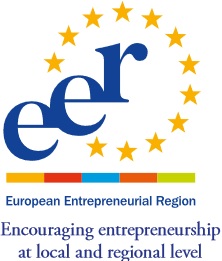 newsitems
newsitems  CoE CyberCrime + Data Protection Chief Seger to EuroFora on Citizens' say at Internet Rules Drafting
CoE CyberCrime + Data Protection Chief Seger to EuroFora on Citizens' say at Internet Rules Drafting
CoE CyberCrime + Data Protection Chief Seger to EuroFora on Citizens' say at Internet Rules Drafting
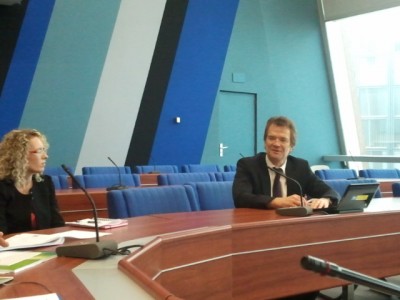
*Strasbourg/Angelo Marcopolo/- Replying to "EuroFora"' Questiions at the conclusion of a landmark PanEuropean/International Confernce on CyberCrime, exceptionaly well attended by many Officials and Experts thoughout all Europe but also from many other areas of the World (f.ex. USA, Japan, Canada, India, Africa, Australia, Brazil, etc), CoE's experienced Head of Private Data Protection and CyberCrime at the CoE, the PanEuropean watchdog on Human Rights, Democracy and Rule of Law, Alexander Seger from Austria, carefully but positively welcomed in principle the possibility of consulting Civil Society Organizations, involved Citizens and other active Internet Players, in addition to the Industry, by giving them a say before Draft Rules on the Web might be definitively adopted by the CoE in the forthcoming period :
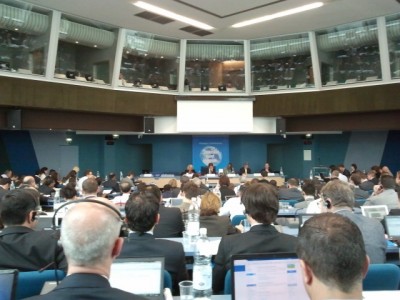
A topical issue with important issues at stake, from Citizens' Rights and Freedoms, up to States' Security and Sovereignity, Economy's production/innovation, including also the need to Protect all of them, i.e. "more than 2,3 Billions People using the Internet", in addition to "Mobile Phones", etc., from risks of Cyber Attacks, such as "Spyware and other Malware found harboured in more than 2.000 Websites every Day", and "about 2 Million Computers infected by Malware every day", in addition to various kinds of "Fraud", "Children Sex Abuse", or other "Attacks against Computer Systems" and/or "Offenses using Computers", "reported all over the World", as COE's Secretary General Thronbjorn Jagland from Norway, observed from the outset.
Particularly when, since the G8 Heads of State/Government Summit at Deauville (France) on May 2011, which launched a Global move on "Internet Governance", (See "EuroFora"s NewsReports from Deauville and Paris), followed by the adoption in Strasbourg of CoE's "2012-2015 Strategy on Internet", last March 2012, currently, both the EU and even more the CoE, are engaged in the preparation of a Series of various New Measures, Rules, Guidelines, Directives, Conferences, reviews, updates, etc. affecting the Web, which are due to pop up soon, starting from the forthcoming Months, f.ex. September and October, as well as December 2012, etc...
- Concerning the Adoption of relevant National Measures and/or the Ratification of the Budapest Convention by various Countries, which might eventually evolve further, f.ex. on TransBorder Data Access issues, etc., (See other, specific "EuroFora" NewsReport, with statements that gave us Russian, American, EU and CoE Top Officials, to be published herewith asap.), "EuroFora" observed that, several times, Officials and/or Experts from various Countries to CoE's 2012 International Conference on CyberCrime, said that they had faced Difficulties with the Public Opinion, when important Draft Laws on the Internet were presented at Parliaments and other Public Decision-making bodies, particularly if they were not well understood, f.ex. in Canada, India, or some EU Countries, at least on certain key points, so that they had to try again and again, meanwhile amending their Drafts, until developments made it possible to, more or less, adopt them.
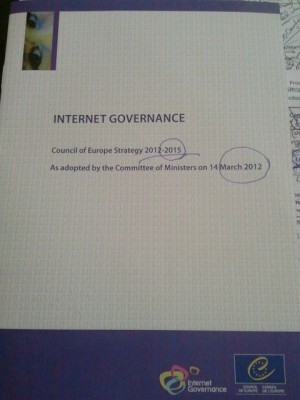
By a coincidence, recently, CoE's brand new "Internet Strategy", (decided on March 2012 under British chairmanship : Comp. "EuroFora"s NewsReports on Foreign Minister Hague 's earlier statements in Strasbourg http://www.eurofora.net/newsflashes/news/hagueoncoeukpriorities.html and Home Office Minister Brokenshire's replies to our Questions on Internet Governance : http://www.eurofora.net/newsflashes/news/coeinternetstrategy.html ), prepared after G8 Heads of State/Government's Summit at Deauville (France, May 2011) started to deal with Internet Governance, (Comp. "EuroFora"s relevant NewsReports on that landmark G8 Summit from Paris and Deauville), setting a General Principle on all Internet-related issues, i.e. not only CyberCrime/Data Protection, urges to try to involve Citizens and Civil Society in the Drafting process of relevant Public Decisions, we also noted.
=> In consequence, "Do you think that, despite the Difficulties on the sensitive matter of CyberCrime, it could be possible and interesting, in order to have the Trust of the People, (who are directly concerned, both because they need themselves Protection from Cyber-Attacks and/or Fraud, but also in order to ensure that Human Rights and Freedom at the Internet will be respected), to associate, in the Future, in an efficient and adequate way, at least some Human Rights and Civil Society Organizations and/or other People active on Internet issues, so that it could become possible to hold better Discussions on thorny issues before Final Decisions, giving a better chance to timely find proper Solutions, instead of risking to face Blockades afterwards, so that things can go ahead ?", "EuroFora" asked Seger.
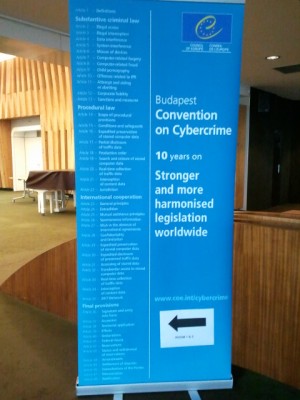
- Sometimes, CoE and/or other Organizations have been criticized for "being Open but Late", concerning Public Consultations, observed from the outset CoE's Head on CyberCrime and Data Protection issues, who is also the Secretary of the PanEuropean/Global Treaty against CyberCrime, known as "Budapest Convention".
- We (CoE) have already tried to consult such Civil Society Organizations, particularly on Data Protection issues, and there were some of them present here in Strasbourg even during this 2012 CyberCrime International Conference, which made, sometimes, pretty Critical interventions, Seger pointed out.
- "I am personally convinced" that if CoE's Data Protection Treaty's currently prepared Modenization goes ahead, eventually also with some changes in the CyberCrime Convention, then, we'll have to include Public Consultations, he positively replied.
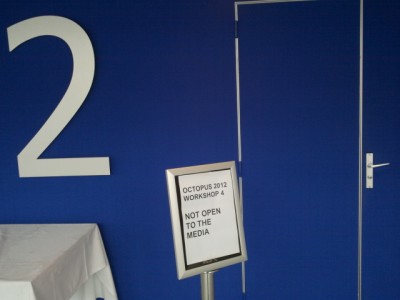
- If yesterday we worked in one Workshop on a TransBorder Data Access thorny issue, (where a Compromise has yet to be found between the respect of independent States' Sovereignity and the need for Law Enforcing Agencies to fight CyberCrime by searching relevant Data accross Borders : See specific "EuroFora"s NewsReport, with Statements that gave us the Head of Russian Foreign Ministry's Department on New Challenges Ernst Chernukhin, "Microsoft"'s Chief Security Advisor for Europe, Middle East and Africa, Monica Josi/USA, CoE's Director on Legal/Human Rights standards Jan Kleisjen, etc),
behind Closed Doors for the Press, and under "Chatam House" rules, (which prohibit participants from revealing what really happened inside the Room), it was because we (COE) wanted to give to the concerned Governments a chance to say what they really wanted, share their concerns and discuss them between them, at first, he revealed.
>>But, "once this is done", afterwards, we (CoE) can also involve not only Industry, but also various other Civil Society Organizations, CoE's key official agreed in conclusion with "EuroFora"s suggestion.
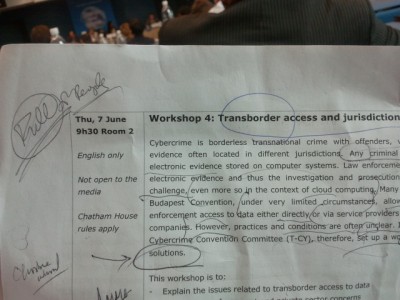
The point is of exceptional importance today, because, after the G8 Deaville Summit (May 2011), and during the subsequent Brittish CoE Chairmanship (November 2011 - May 2012), the CoE has recently started to prepare a lot of Draft Rules, updates, additions, modifications and/or new measures on the Internet, as well as to work harder for an adequate and efficient Implementation of rules already adopted earlier, (including, f.ex. by urging Private Internet Access providers to offer more cooperation, particularly on Data, with CyberCrime-fighting National Authorities, etc).
- Thus, among various other concrete examples, CoE is currently engaged in an important Review of its landmark; Histioric PanEuropean/International Convention on Private Data Protection, which reportedly needs a "Modernization" and to be updated, 30 Years after its initial adoption, while, in parallel, a previous CoE Recommendation on Pivate Data use by the Police in the struggle against CyberCrime, which is due to be presented from September 2012, he added.
+ Meanwhile, there is also an important "Cyber-Space" European Conference to be held on October in Budapest (Hungary), including both Safety and Security but also Technologic Developments, Economy and Politcs, (a follow-up to the 1st such Mega-meeting in London, on 2011, due to be extended on 2013 in South Korea : See Ambassador Bela Szombati, Head of Cyberspace Conference at Hungary's Foreign Ministry statements to "EuroFora", to be published at anothet NewStory asap), while Rome (Italy) also hosts soon another Conference on Digital Society issues, (in addition to EU's "Digital E-Dialogue", in the run up to a future EU Directive on the Internet, currently examined by EU Parliament) etc., which, added to EU and CoE possible Public Consultations on-line, Hearings, etc. could provide more opportunities for Civil Society actors involved in Internet issues to have a say.
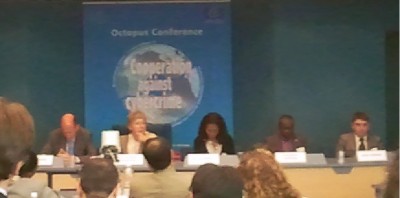
Something obviously necessary regarding, in particular, "Measures against CyberCrime (which) go hand in hand with the protection of Human Rights and the rule of Law", as reminded CoE's experienced Deputy Secretary General, Maud de Boer-Buquichio, speaking on the 2012 CyberCrime Conference's conclusions.
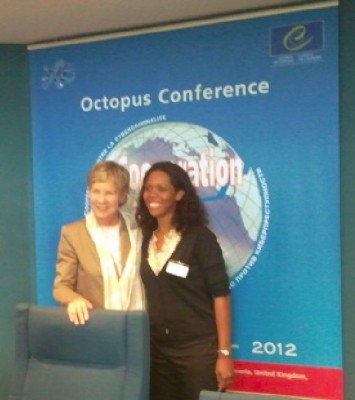
++ In addition, questioned earlier by "EuroFora" on a partly related, and Topical issue, concerning the developments about the progressively growing participation of the so-called "Pirate Parties", notoriously spreading from Scandinavian Countries (initially Sweden) towards Germany (where they got some 5% or even 7 to 8% in recent Regional Elections at Berlin, North Reinland-Westfalia (NRW) in 2011 and 2012, etc, after winning even 2 EU Parliament seats since 2009, currently starting to emerge even in French Parliamentary Elections with more than 100 Candidates, while focusing on the preparation of the forthcoming, 2014 EU Parliament new Elections, Seger had an interesting reaction :
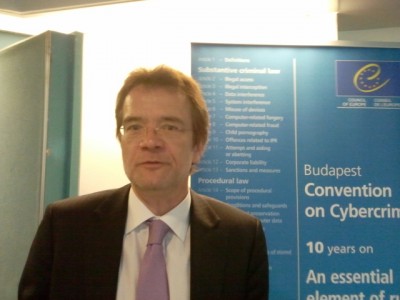
- While clearly distinguishing between CyberCrime related issues, such as eventually blatant CopyRight violations; etc., and Freecom of Access to the Internet, Cittizens private Data protection, as well as new, innovative ways to develop Internet tools for E-Democracy, etc., CoE's experienced Official replied to "EuroFora"s question by stressing mainly that, as a matter of general principle, any serious Public Debate on topical Internet issues in the framework of Democratic Institutions is welcome as part of contemporary Democracy.
+ By another coincidence, at a subsequent meeting organized in the context of CoE's Forum for Democracy, and chaired by experienced former Minister and Ambassador/Permanent Representative of Poland to the CoE, now Top PanEuropean oficial, Piotr Switalski, he anounced an apparently interesting gathering focused for the 1st time on "Liquid Democracy", at the CoE for the beginning of July, (hopefully not during an overloaded day of EU Parliament's plenary session of 2 to 5 July 2012 iN Strasbourg, as he added to "EuroFora") :
A term also known for a famous, innovative Software proposed for various innovative uses of the Internet in some kinds of Direct E-Democracy by recent advocates, including by the controversial PP,....
***
(NDLR : "DraftNews", as already sent earlier to "EuroFora"s Subsrcibers/Donors. A more accurate and full Final Version may be published asap).
***
Main Menu
Haupt Press Deontology/Ethics 2009 Innovation Year EU endorses EuroFora's idea Multi-Lingual FORUM Subscribers/Donors Häufig gestellte Fragen Die Elxis Lizenz Erweiterte Suche EuroFora supports Seabird newsitems In Brief European Headquarters' MAPs CoE Journalists Protection PlatformBRIEF NEWS
- 00:00 - 02.06.2021
- 00:00 - 18.10.2020
- 00:00 - 19.06.2020
- 00:00 - 18.05.2020
- 00:00 - 20.04.2020
- 00:00 - 02.02.2020
- 00:00 - 09.12.2019
- 00:00 - 27.11.2019
- 00:00 - 16.11.2019
Popular
- Yes, we could have prevented Ferguson riots says World Democracy Forum's Young American NGO to ERFRA
- Spanish People Elect CenterRIGHT Majority with 1st Party and Total of 178 MPs (6 More than the Left)
- Pflimlin's vision
- The European Athletic "Dream Team", after Barcelona 2010 Sport Championship Results
- Source Conseil d'Europe à ERFRA: Debatre Liberté d'Opposants à Loi livrant Mariage+Enfants à Homos ?
- Head of BioEthics InterGroup, MEP Peter Liese : "Embryonic stem cell research reaching its END" !?
- Spain: Jailed Turkish Terror suspect with Explosive,Drones,Chechen accomplices stirs Merah+ Burgas ?
- UN Head Ban Ki Moon at CoE World Democracy Forum : - "Listen to the People !"
Latest News
- EUOmbudsmen Conference 2022: Digital Gaps affect People's Trust threaten EF Project on EU Future ?
- French Election : Black Out on Virus, but Obligation for Fake 'Vaccines" Challenged
- Both French Presidential Candidates point at "Humanism" in crucial times...
- France : Zemmour = Outsider may become Game Changer in Presidential + Parliamentary Elections 2022
- PACE President Cox skips Turkey Worst (Occupation) case compared to Russia (DeMilitarisation) query
Statistics
Besucher: 58986276Archive
Login Form
Other Menu
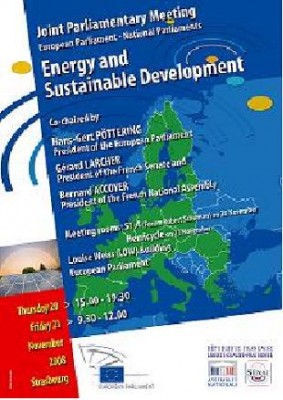
Strategically located between Paris and Prague, Strasbourg offered a natural location for the French and Czech EU 2008 and 2009 Presidencies to tune their agendas for a resolute European move towards Renewable Energies, during an exceptional Joint Parliamentary meeting on "Energy and Sustainable Development", co-organized here by the Presidents of EU Parliament, Hans Gert Poettering, French National Assembly, Bernard Accoyer, and Senate, Gerard Larcher, on November 20 and 21.
Concluded by a busy-looking French super-Minister of Energy, Environment and Regional planning, Jean-Louis Borloo, the exceptional gathering of Top MPs from all 27 EU States' Parliaments hoped that a Ministerial meeting prepared by Borloo, will pave the way to an overall agreement at the level of EU Heads of State and Government Summit chaired on December 2008 by French President Nicolas Sarkozy, allowing the next EU chair, the Czech Republic, to start working from the beginning of 2009 on concrete measures.
Speaking to "EuroFora" President Accoyer resumed the general feeling by stressing that "Europe has no Oil-Gas resources, but an important Scientific-Technologic potential. Therefore, we must develop Renewable Energy sources". "Since the Sun is the most abundant and free RES, we must do the outmost to boost Solar Energy" solutions, he added, at the eve of a special meeting on Solar energy and the Mediterranean organised by Borloo on Saturday.
Oil-gas supplies' security and diversification were also examined by the EU gathering, after which, President Accoyer replied to our question on risks of long, expensive and fragile pipe-lines' projects, crossing through foreign countries out of the EU, compared to new possibilities for Sea and River Ship direct EU transport even of Gas, thanks to New Liquification technologies : - "We have just écreated the Union for the Mediterranean for concrete projects like these", Accoyer stressed, speaking of Sea-River Ship Highways, fundeable under EU's TENS programs.
Rapporteur on "Energy innovation and sustainable development", Dr. Bedrich Moldan, vice-President of Czech Senate's Environment and Regional Development Committee, added that Climat issues, price uncertainties and diminution of accessible Fossil energies, played together with EU's RST potential in order to make RES both a need and "an opportunity". However, in cases as "Solar Energy, even if the main Scientific ideas are already here, we have to make some technologic breakthroughs in order to find how to produce it on a large scale, store and transport it", Dr. Moldan added to "EuroFora".
Czech interest for RES was also expressed, earlier in Strasbourg, by Jan Kohout, the deputy Minister pf Foreign Affairs who participated to a workshop on "Renewable Energies" organized by the French EU 2008 Presidency : - "The focus is on Development", he told us.
On this and other RES issues, Dr. Moldan anounced the Czech EU 2009 chair's intention to organize an important 2-days Conference on Renewable Energies and Sustainable Development late January 2009 at nearby Prague.













